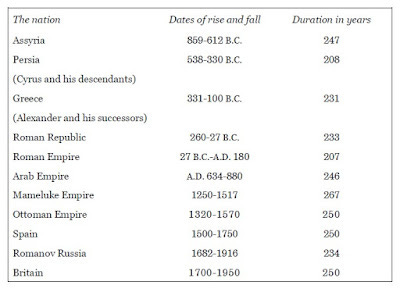The Fate Of Empires by Sir John Glubb
It's often said that humans never seem to learn from history, a statement that the current chaos in the world only serves to reinforce. Yet, if we hope to understand the rise and fall of empires, we must delve into the annals of history and attempt to extract any relevant lessons that can be applied universally.
By examining the successes and failures of past imperial ventures, we can uncover the underlying principles that govern the fate of nations and gain a deeper understanding of the patterns that have been repeated throughout history.
Here is the list of rising and fall of past empires & time periods.
Sir John Glubb explores the patterns of rise and falls in empires throughout history to discover the laws that govern their fate. Yet, despite the lessons of history, humanity has failed to learn from them, as demonstrated by the chaos in the world today.
Sir Glubb highlights the recurring pattern of change happening every 250 years, which marks the rise and decline of global powers. He notes that small nations, often overlooked, can suddenly emerge and overrun large areas of the world.
The Roman Empire, for instance, once spanned from Britain to Syria and Egypt, a distance of about 2,700 miles. Today, nearly twenty independent countries separate Britain from Syria, each with its government, laws, and currency, making cooperation challenging.
The education system, too, transforms from producing brave patriots to training students for the highest-paying jobs. This lowering of objectives is not a new phenomenon, as an Arab moralist, Ghazali, complained of the same issue in the declining Arab world in his time.
There are six stages of the rise and fall of great nations:
The Age of Pioneers,
The Age of Conquests,
The Age of Commerce,
The Age of Affluence,
The Age of Intellect, and
The Age of Decadence.
He uses the example of the Arab world under Harun al-Rashid and Mamun to illustrate the first free public hospital opening in Baghdad and the city's glory days as the world's greatest and most prosperous city in the ninth century.
So things keep changing. And depending on time, era & personal circumstances, human beings keep taking their decisions. These decisions, if made on a large scale by the masses, change the culture, which leads to a new phase for that country.
For a complete document: Do refer to the weblink below.
Source Credit: Fate of Empires (uncw.edu)
As I continue to self-educate on various topics such as technology, Energy, and life, I am fortunate to have wise individuals around me, directly and indirectly, from whom I can learn. Despite my best efforts, I may unintentionally miss something, but I am not too concerned about mistakes I am unaware of, as this is all part of the learning process. However, I hold myself accountable for any mistakes I make when I fully understand the topic at hand.


